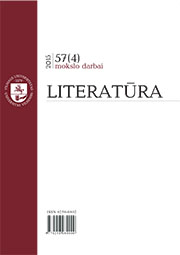MIGRANTĖS MOTINOS TAPATUMAS BETTY QUAN DRAMOJE GIMTOJI KALBA
MIGRANT MATERNAL SUBJECTVITY IN BETTY QUAN’S MOTHER TONGUE
Author(s): Eglė KačkutėSubject(s): Language and Literature Studies, Studies of Literature, Migration Studies, Ethnic Minorities Studies, Theory of Literature
Published by: Vilniaus Universiteto Leidykla
Keywords: maternity; emigration; identity; mother’s; subjectivity; bilingualism
Summary/Abstract: The article explores maternal subjectivity of a migrant mother as portrayed in the play Mother Tongue by the Canadian playwright of Chinese origin Betty Quan. It argues that by reproducing home through embodied practices, such as speaking Cantonese to the exclusion of English to her children, the mother works against the dissolution of her identity, but due to the cultural and personal trauma, becomes fixated on that identity essentially belonging in the past and is only able to face the challenges of the present (such as acknowledging the needs of her growing children), when the set ways of family dynamics is disrupted. The development of her mother’s subjectivity is considered using theoretical models developed by gender and migration theorist Irene Gedalof and psychoanalyst Julia Borossa. Gedalof claims that the repetition of the same cultural rituals performed by migrant mothers is not an act of reproducing sameness, but rather a dynamic process that creates difference and produces rather than reproduces identities. Borossa argues that the mother tongue is always already lost to all humans. For her, becoming a fully formed subject involves accepting the loss of the childhood language and acquiescing to speaking a different language – be it a foreign language or the native tongue that has developed since childhood. It follows, that a fully developed migrant mother should be able to accept that she as a mother and her mother tongue can never coincide and resign to speaking a foreign language to her children whilst keeping her native tongue as memory-trace. In the case of the mother in Quan’s play, her fear of annihilation by her children’s voices in foreign English originates from her not having come to terms with the separation from her mother tongue, which is symbolically contained in her infantile fixation on and identification with the traumatic past together with the language of the past. However, the end of the play opens up a window of hope. In conclusion, the biggest challenge for a migrant mother in Mother Tongue is developing a common identity with her children who feel foreign to her. The play suggests that this can be achieved by passing on the mother’s cultural identity onto the children through ritualistic practices of which speaking the mother tongue is an importantn component, but also opening up to the children’s cultural difference by learning the language of their socialisation and the dominant culture thus establishing a more mature and empowered maternal subjectivity and capacity for more adequate mothering.
Journal: Literatūra
- Issue Year: 57/2015
- Issue No: 4
- Page Range: 68-81
- Page Count: 14
- Language: Lithuanian

